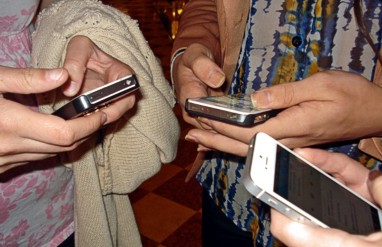Please, Let’s Talk
By Barrington H. Brennen, January 3, 2017
PDF Format
 |
|
Barrington H. Brennen |
|
We are spending too much time on our smart phones and
tablets texting to one another instead of talking face to
face. While the smart phone and texting can be a positive
tool for quick and convenient communication, too much
texting is not healthy for building long-lasting healthy
relationships and it is not good for the brain.
I have literally seen people going for walks, sitting by the
beach, and waiting at the bus stop, and all they are doing
is looking at their smart phones texting or surfing the
Internet. Some are even texting while they are stepping on
the bus. While we feel good receiving instant messages,
there are times we must look up. You need to look at people
around you. Take in the moments. Look at nature. What’s
most embarrassing and perhaps insulting is when there is
family or community social gathering and the majority of
people are looking at their tablets or smartphones instead
of interacting with one another. Perhaps it is wise that
when there is a family dinner or group gathering designed
for social interaction, the organizers have a receptacle at
the entrance in which everyone leaves his or her smartphone
until the event is over.
My wife and I were at a neighborhood eatery where there is a
place for people to relax and socialized. Right away we
observed that we were the only ones talking with each other
and looking at each other. Every table had either a
family, teens, or single adults who were all looking at
their smartphones. They were not even talking to each
other. It was a deafening silence and a pitiful sight to
behold. “Is this socialization?” I said to myself. The
other morning, I saw a man whose dog was walking him. Yes,
that is true. He was not walking his dog. The dog was on
the leash pulling him along as his head was turned downward
with his eyes fixed on his smart phone and his fingers were
continuously clicking away. It was a good thing there was
no traffic on the street at that time.
I wonder if we are losing the art of talking with each
other. It concerns me that if we continue down this
pathway, relationships and communications in relationships,
as we once knew it, face to face, will be something of the
past and it will really be detrimental to our very
existence. We will no longer know how to interpret body
language, tone of voice or inflections.
 Let me once again hasten to say that I am not against using
a smartphone, iPad, or another modern device to help us be
more efficient and to keep in contact with each other.
During the past four years, Annick and I have actually
watched our four grandchildren literally grow simply by the
weekly free video communication via Messenger, WhatsApp,
Hangouts, Snapchats, Google, etc. When we finally met them
face to face they responded as though they have always been
in our presence. Despite this positive experience, we have
learned that nothing can replace the human touch and face to
face sharing. Nothing.
Let me once again hasten to say that I am not against using
a smartphone, iPad, or another modern device to help us be
more efficient and to keep in contact with each other.
During the past four years, Annick and I have actually
watched our four grandchildren literally grow simply by the
weekly free video communication via Messenger, WhatsApp,
Hangouts, Snapchats, Google, etc. When we finally met them
face to face they responded as though they have always been
in our presence. Despite this positive experience, we have
learned that nothing can replace the human touch and face to
face sharing. Nothing.
ANOTHER SIDE OF THE STORY
Interestingly, there is even a global trend towards less and
less use of voice mail (leaving a message on the phone) even
as a part of professional services. Neil Howe, in his July
2015 article, “Why Millennials Are Texting More And Talking
Less” states: “As part of a firm-wide campaign to cut costs,
JPMorgan Chase offered to eliminate voicemail for thousands
of employees who don’t interact directly with clients. About
65% took the offer, resulting in over $3 million in annual
savings. Executives say that the decision is overdue,
pointing out that most workers—particularly those under
40—have long relied on e-mail, text messaging, instant
messaging, or social media to reach others on the job and in
their daily lives.” Neil continues to explain that several
huge companies decided to follow suit. Coca-Cola KO made
a similar move, only 6% of employees decided to keep it.
Bank of America BAC and Citigroup are considering following
suit. In 2012, Vonage reported that the number of voicemail
messages left on user accounts dropped 8% from the year
before, while the number of people who retrieved their
messages fell 14%. In a Harvard Business Review essay urging
companies to dump voicemail, author Michael Schlage doesn’t
mince words: “A communications medium that was once
essential has become as clunky and irrelevant as Microsoft
MSFT -DOS and carbon paper.”
While this might not be that negative and it is saving
millions of dollars, it might be feeding into a trend that
in the long run might be more non-productive because the
human touch would have been lost.
I do admit that Millennials think differently than Baby
Boomers and the rest of us. Neil states: Millennials are
shying away from calls and moving toward texting because
many of them see the phone as “overly intrusive, even
presumptuous.” Thus, a less intrusive force of
sharing—texting. How cold are we going to get!
THE WEAKNESS
There are some concerns about the long term use of
smartphone texting. In the article “5 Worrying Ways
Texting Affects Your Health, Your Relationships, and Your
Brain” by Gabrielle Moss, he shares this painful finding:
“You've probably heard the bad news about "text neck," a
medical condition caused by the downward angle we hold our
heads at while texting, emailing, and otherwise using our
smartphones. The pressure that bending our head down puts on
our necks creates text neck's side effects, which can
include strained muscles, pinched nerves, and herniated
discs (yup, the same kind of herniated discs that often
require surgery). Doctors even worry that, if nothing is
done to correct it, text neck could eventually even lead to
the neck's natural curve being distorted.”
What about relationships. There is no evidence that texting
itself can damage relationships. Sometime texting helps
because it is quick and easy way to tell your partner that
you will get home later than planned. Research indicates:
“While texting affectionate thoughts was viewed as improving
the relationship's overall quality, relationships that
prominently involved texting to apologize or make decisions
were ranked as lower quality by women, while relationships
that involved very frequent texting were ranked as lower
quality by men. . . Study researcher Jonathan Sandberg noted
that using text messages to hash out important relationship
issues can strain a relationship's emotional development and
the bonding of the pair in it, because when you limit most
of your conversations to texting you miss out on the natural
cues—body language, tone of voice, intonation, inflections,
that really impact our views and interpretation. I have
come to realize that there are lots of arguments because the
one who sent the text forgets that the receiver did not see
the body language or hear the voice intonations.
THE BRAINS OF TEENAGER
Space would not allow me to share all I can on this topic.
But I must share this serious findings about texting and
brain development in teenagers. “A 2010 Canadian study on
the link between texting and adolescent brain development
found that teens who used smartphones frequently performed
worse on tests measuring memory and attention span than
teens who used their phones less often. Epidemiologist Dr.
Michael Abramson, a professor at Monash University and the
lead researcher on the study, postulated that this might be
because smartphone technology like predictive text trains
teens to work too quickly and make frequent mistakes.”
Dear reader, let’s spend more time talking face to face and
less time texting. Let us be respectful while in the
presence of friends, in relationships or in meetings by
putting away the smartphones or tablets. Let's talk more and
text less.
Let’s talk,
please.
Barrington Brennen is a counseling
psychologist, marriage and family therapist and board
certified clinical psychotherapist and Nationally Certified
Psychologist, in the USA. Send your questions toquestion@soencouragment.org
or call 242-327-1980 or
visit www.soencouragement.org